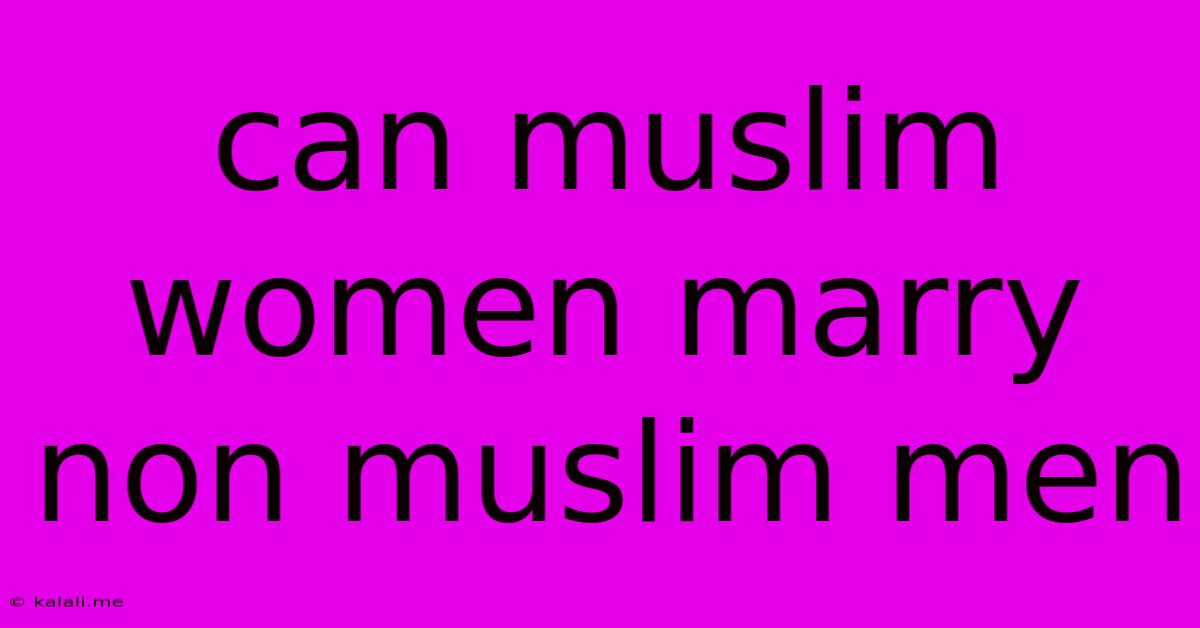Can Muslim Women Marry Non Muslim Men
Kalali
May 21, 2025 · 2 min read

Table of Contents
Can Muslim Women Marry Non-Muslim Men? A Comprehensive Look at Islamic Marriage Laws
The question of whether Muslim women can marry non-Muslim men is a complex one, deeply rooted in Islamic jurisprudence and varying interpretations across different schools of thought. This article explores the prevailing views within Islam on this matter, highlighting the core principles and potential implications. Understanding this issue requires sensitivity and respect for diverse interpretations.
Understanding Islamic Marriage Principles
Islamic marriage, or Nikah, is considered a sacred contract, not merely a social or civil union. It's based on principles of mutual respect, love, commitment, and the establishment of a stable family unit rooted in Islamic values. Key tenets include:
- Consent: Both partners must freely and willingly consent to the marriage.
- Witness: The marriage requires witnesses, typically two adult Muslim males, to ensure its validity.
- Mahr: The groom is obligated to provide a mahr (dowry) to the bride, symbolizing his commitment and providing financial security.
- Protection and Support: The marriage is meant to provide a framework of mutual protection, support, and companionship.
The Predominant Islamic View:
The overwhelming consensus among Islamic scholars is that Muslim women are generally prohibited from marrying non-Muslim men. This prohibition stems from several key verses in the Quran and the teachings of the Prophet Muhammad (peace be upon him), which emphasize the importance of maintaining faith and shared values within the marital union. The concern is that marrying outside of the faith could lead to conflicts in beliefs, practices, and the raising of children.
Variations in Interpretation:
While the dominant view prohibits such unions, some less common interpretations offer nuanced perspectives. These interpretations, however, are often based on specific contextual considerations and are not widely accepted within the mainstream Muslim community. It is crucial to understand that these alternative viewpoints are not the prevailing legal opinion within Islamic jurisprudence.
Potential Challenges and Considerations:
The prohibition against marrying outside the faith is not merely a matter of religious law; it also addresses potential practical challenges:
- Religious Practices: Differing religious practices and beliefs could create significant tension and conflicts within the marriage.
- Child-Rearing: Raising children within a household where there is a divergence in religious beliefs presents unique challenges related to faith education and cultural identity.
- Social Acceptance: Such marriages may face social disapproval and pressure within the Muslim community.
Conclusion:
The question of whether a Muslim woman can marry a non-Muslim man is a multifaceted issue with a clear, dominant answer within mainstream Islamic thought: no. This prohibition stems from core religious tenets and aims to protect the sanctity of marriage and the well-being of the family unit. While alternative interpretations exist, they are not widely accepted. Understanding these nuances and the prevailing legal opinion within Islamic jurisprudence is crucial for individuals considering such a union. Seeking guidance from knowledgeable Islamic scholars is strongly recommended before making such a significant life decision.
Latest Posts
Latest Posts
-
Does A Candle Heat Up A Room
May 21, 2025
-
Why Is A Toilet Called A John
May 21, 2025
-
Is Surgical Spirit The Same As White Spirit
May 21, 2025
-
How Do I Stop A Door From Swinging Open
May 21, 2025
-
Expression Meaning To Conform To The Accepted Standards
May 21, 2025
Related Post
Thank you for visiting our website which covers about Can Muslim Women Marry Non Muslim Men . We hope the information provided has been useful to you. Feel free to contact us if you have any questions or need further assistance. See you next time and don't miss to bookmark.